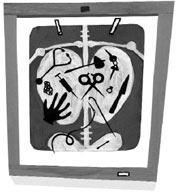IT’S A TEACHING hospital, but just what are they teaching? asks Delia Alberstein. The Blaine homemaker and cancer patient had a 13-inch surgical tool left in her abdomen after surgery at the University of Washington Medical Center (UWMC) last year. Now, in the wake of reports that doctors left surgical instruments and tubing inside at least six patients over the past five years, she has filed a claim against the UW seeking $500,000 and “proof” the university has made changes to avoid similar medical errors.
There are 300 tools used during an average surgery that can cause pain and infection when left behind. A surgical retractor is inserted beneath an incision as a shield from suturing needles; then it is supposed to be slipped out before the final suture.
Alberstein carried the metal retractor for six weeks after her Sept. 13, 2001, surgery for an ovarian tumor.In her claim filed with the state and released last week to Seattle Weekly, Alberstein says she was unable to move, sit, or sleep without pain until the flexible instrument was removed during a second surgery Oct. 27.
Her operation took place 16 months after a similar 13-inch malleable retractor had been left in the abdomen of another UW cancer patient, Donald Church. He carried the instrument for two months after his June 2000 tumor surgery and received a $97,000 settlement last month. His story drew worldwide publicity and reaction.
The UW’s Case of the Missing Instruments began to unfold Dec. 3, 2001, when Church, a Seattle pest-control technician, first spoke publicly about his postoperative agony. “There were times when I would just lie on my bathroom floor sobbing” from the pain of the retained retractor, he said. “I thought I must be dying.”
Four days later—partly as damage control to preserve its reputation as one of the nation’s top teaching hospitals— the UW revealed it had left instruments in four other patients during the past five years (additional records obtained by the Weekly showed there was a sixth patient). UW doctors called the rate of such errors “low” and reassured the public that their medical care was “second to none.”
Two unpublicized settlements preceded Church’s case, however. A Mississippi woman received $150,000 last May because doctors left behind a 6-inch Babcock clamp during her surgery. A Tacoma man who had a second operation to remove tubing from his scrotum received $40,000 in 1997.
Settlement papers in the clamp and tubing cases note that all parties agreed to keep details confidential from “anyone, including the media.”
The UW records office says no claims have been filed in the two other instances of retained instruments, both of them cardiac retractors used in heart surgery. Even so, that means the UW has paid almost $300,000 to patients who had to undergo a second surgery because of “retained” medical objects.
In the latest case, Fred Zeder, Alberstein’s attorney, says his client does not want to comment directly. But in her claim, she says that any “measures supposedly taken [after Church’s case] by the university to prevent a recurrence were not sufficient to remedy the situation,” adding she won’t settle her claim unless the UW “demonstrate[s] that it has instituted adequate remedial measures” this time.
She also says she believes “some portions of surgeries” at UWMC “are routinely performed by residents in training, rather than the attending physicians themselves,” and suggests her tumor surgery was handled by unsupervised residents.
Despite the gravity of such charges, the only comment from L.G. Blanchard, UWMC spokesperson, was “I’m sure her lawyer will be grateful for your efforts” in revealing her allegations (neither Zeder nor Alberstein have sought publicity for their claims).
It appears the UW has, however, already obliquely commented on the case. At the UW’s Dec. 7 press conference concerning medical errors, medical director Eric Larson was apparently referring to Alberstein when he mentioned “the most recent case” and said, “We have accepted responsibility for this error and apologized to the patient. As in the case of Mr. Church, the woman has made a full recovery from her cancer surgery and is doing well.”
Though that sounded like there’d been a meeting of the minds, Alberstein filled out a claim form the next day.
Alberstein’s lawyer Zeder says the patient has not fully recovered—”she still has repercussions”—and remains concerned about the UW’s hospital procedures.
After her first surgery, Alberstein’s pain was “severe and persistent” from the retractor inside her, Zeder says. Alberstein had to be helped around the hospital by relatives, and doctors told her she must have a low tolerance for pain, she says. Sent home with a prescription for a narcotic pain medicine to take as she continued chemotherapy treatment, Alberstein was eventually X-rayed and the retractor detected, then removed.
“Considering all that’s happened,” says her attorney, “her prognosis is pretty good.”








